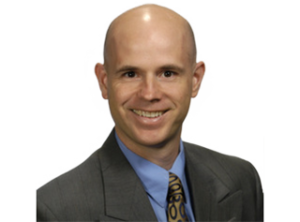NEWS
Dr. David Hall
You’re a Louisiana Tech College of Engineering and Science (COES) student and a certain course has got you down? Feel like you can’t go on, as if you’ll never get your degree, much less a job?
Adjust that attitude and consider this: Dr. David Hall, not only an associate professor of mechanical engineering but also the University’s Director of Project-Based Learning, Industrial Engineering, and Instrumentation and Control Systems Engineering Technology, has been there.
 He completed his B.S. in mechanical engineering from Tech with a 3.79 GPA. But why wasn’t that a 4.0?
He completed his B.S. in mechanical engineering from Tech with a 3.79 GPA. But why wasn’t that a 4.0?
“Circuits,” he said. “I was clueless.”
One man’s trash is another man’s circuits, and only the Academic Gods know for certain where the chips will fall. But the bottom line is, these things happen.
Knowing that, Hall battled on, duking it out with books and equations and monochrome monitors back in the days of the 5-and-a-quarter-inch floppy disks. He earned his master’s degree and Ph.D., both in mechanical engineering, from the Georgia Institute of Technology in Atlanta and worked in the private sector for a tiny period of time.
“It was definitely interesting,” he said of his time as a Process Engineer for International Paper, “but I loved my graduate research at Georgia Tech and that’s probably what pushed me back to academia. I love learning and designing content that brings applications to my students.”
He became a Tech student because geography and status intersected at precisely the right time and place for the Junction City, Arkansas native.
“Tech was nearby and had an excellent reputation in engineering,” he said. “There was never a real consideration that I would go anywhere else.”
Good for everyone. Since arriving at Tech as an assistant professor in 1995, he’s earned the COES Leadership Award, been named Outstanding Faculty Advisor, been awarded the COES Outstanding Teaching Award, and been honored with the F. Jay Taylor Undergraduate Teaching Award. All the while, he’s been an integral part of the evolving College, one whose stellar reputation has grown positively since his arrival, first as a student and now as a professor.
“While the topics and fundamental content (of the COES) are roughly the same,” Hall said, “we spend a lot more time on computers now than we did back then. We did have computers, but they were used mostly for programming and word processing.”
Educators from all over the world visit the COES regularly to see what’s going on in the College, which is a lot. One thing introduced 15 years ago and now in Hall’s care is Living with the Lab, which gives “our beginning engineering students a lot more hands-on, team-based learning,” Hall said, “as well as some cool tools and a robot. A few other exceptional unparalleled educational opportunities are the Eco-Car group, the Baja SAE (Society of Automotive Engineers) vehicle competition, and Dr. Kelly Crittenden’s 3D printing class. Our seniors are working on real-world engineering projects due to Dr. Henry Cardenas’ Senior Design Consortium.”
But the strength of the mechanical engineering program will never be a building—the much-needed new Integrated Science and Engineering Building (IESB) is scheduled to open next fall—or robots or even dumbed-down (or up) courses in circuits. The University is only as good as the captains sailing the ship.
“Our faculty is excellent,” Hall said. “Our mechanical engineering faculty is especially committed to educating engineers that know their stuff.
“My focus these days is to expand our Living with the Lab approach to sophomore and upper-level engineering courses,” he said. “My dream is that all engineering courses would provide students with the opportunity to conceive, design, and build working systems while they learn the fundamentals.”
Recent Comments